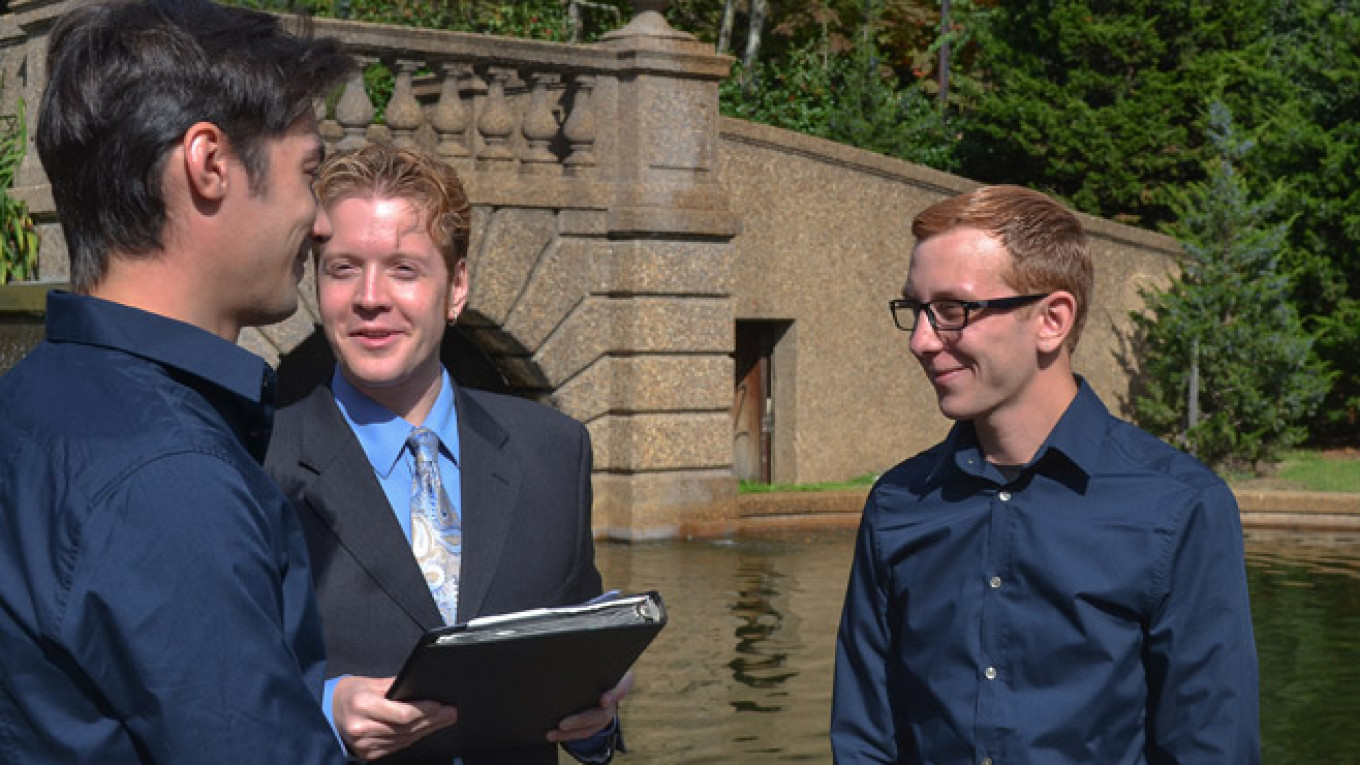NEW YORK — Had he stayed in Russia, Andrew Mironov would be settling into a stable job with an oil company, likely with a newly awarded doctoral degree in electrical engineering. Instead, he faces an uncertain future in New York City as one of scores of Russian gays seeking asylum in the United States because of hostility and harassment in their homeland.
Yet the sacrifices have been worth it, the 25-year-old said, given the fears that lingered after he was severely beaten by several assailants in the lobby of a gay bar in his home city of Samara.
"Which is more important: happiness or success?" he asked. "I would say happiness. I feel no fear here."
There are no firm statistics on the number of gay Russian asylum seekers. U.S. government agencies that handle applications do not report such details. However, the Department of Homeland Security's latest figures show that overall applications for asylum by Russians totaled 969 in the 2014 fiscal year, up 34 percent from 2012.
The increase is due in part to the worsening anti-gay climate in Russia, according to Immigration Equality, a New York-based organization that provides legal services for lesbian, gay, bisexual and transgender immigrants.
The organization says the number of inquiries it received from gay Russians seeking U.S. asylum has risen from 68 in 2012 to 127 in 2013 and 161 through Oct. 30 of this year. During that period, gay-rights gatherings in Russia were frequently targeted by assailants, and the parliament passed a law targeting "gay propaganda" that was widely viewed as a means of deterring gay activism.
To get an application approved, an asylum seeker must present a convincing case that he or she has a "well-founded fear of persecution" in their home country.
Aaron Morris, Immigration Equality's legal director, said most of the recent asylum inquiries came from gay men in their 20s and 30s who had been targeted by anti-gay attacks.
In several U.S. cities, programs have been launched to assist gay asylum seekers from Russia and elsewhere as they await processing of their applications, which can take six months or more. For the first five months, the asylum seekers are barred from taking paying jobs, so they often struggle to support themselves.
In Washington, D.C., housing is among the major challenges, according to Matthew Corso, who has helped the D.C. Center for the LGBT Community create a program to assist people who are seeking asylum.
Another group aiding gay Russian asylum-seekers in the Washington area is the Spectrum Human Rights Alliance, founded in 2011 by Russian immigrant Larry Poltavtsev.
Poltavtsev is frustrated by the rules that bar asylum-seekers from working. "It makes no sense because most of our arrivals have advanced degrees and speak good English," he said.
Soon to join the queue of applicants are Andrew Nasonov and Igor Bazilevsky, longtime partners from the city of Voronezh who wearied of threats, harassment and beatings and came to the United States in July. They're now assembling the paperwork for their case.
Nasonov, 25, was a journalist and human rights activist in Russia; Bazilevsky, 32, was a graphic designer. They've been provided with lodging by a gay couple in a Washington suburb and took a step in October that would have been impossible in Russia — they got married.
"We were finally able to say that we are a real family — there are not enough words to describe how wonderful these feelings are," Nasonov wrote in an e-mail.
In New York City, many asylum seekers have received advice and support from Masha Gessen, a Moscow-born journalist and activist whose family moved to the U.S. in 1981.
She said her family, as Soviet Jews, had group refugee status, allowing for an immigration process far easier than that faced by today's asylum seekers who must prove their individual case.
"There's no worse way to immigrate to the U.S. than the way these people are doing it," Gessen said. "You have nothing, and you have no right to work or public assistance. We've seen people end up on the streets."
She and her allies have lobbied the State Department to extend refugee status to LGBT people from Russia, but to no avail.
The United States is among several countries favored as havens by LGBT Russians. Canada, Finland and Israel are among the others. Morris, the Immigration Equality lawyer, said his legal team had been able to win approval for most of the Russian asylum cases that it has handled.
Morris commended the Department of Homeland Security for asking Immigration Equality to train its asylum officers on distinctive aspects of LGBT asylum cases. "They understand our community is a little different," Morris said.
A Message from The Moscow Times:
Dear readers,
We are facing unprecedented challenges. Russia's Prosecutor General's Office has designated The Moscow Times as an "undesirable" organization, criminalizing our work and putting our staff at risk of prosecution. This follows our earlier unjust labeling as a "foreign agent."
These actions are direct attempts to silence independent journalism in Russia. The authorities claim our work "discredits the decisions of the Russian leadership." We see things differently: we strive to provide accurate, unbiased reporting on Russia.
We, the journalists of The Moscow Times, refuse to be silenced. But to continue our work, we need your help.
Your support, no matter how small, makes a world of difference. If you can, please support us monthly starting from just $2. It's quick to set up, and every contribution makes a significant impact.
By supporting The Moscow Times, you're defending open, independent journalism in the face of repression. Thank you for standing with us.
Remind me later.






